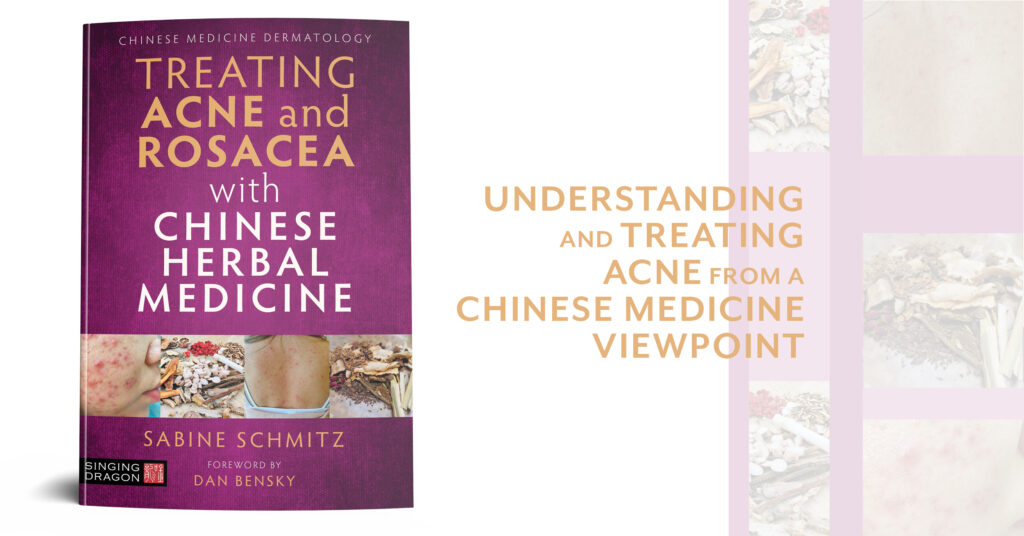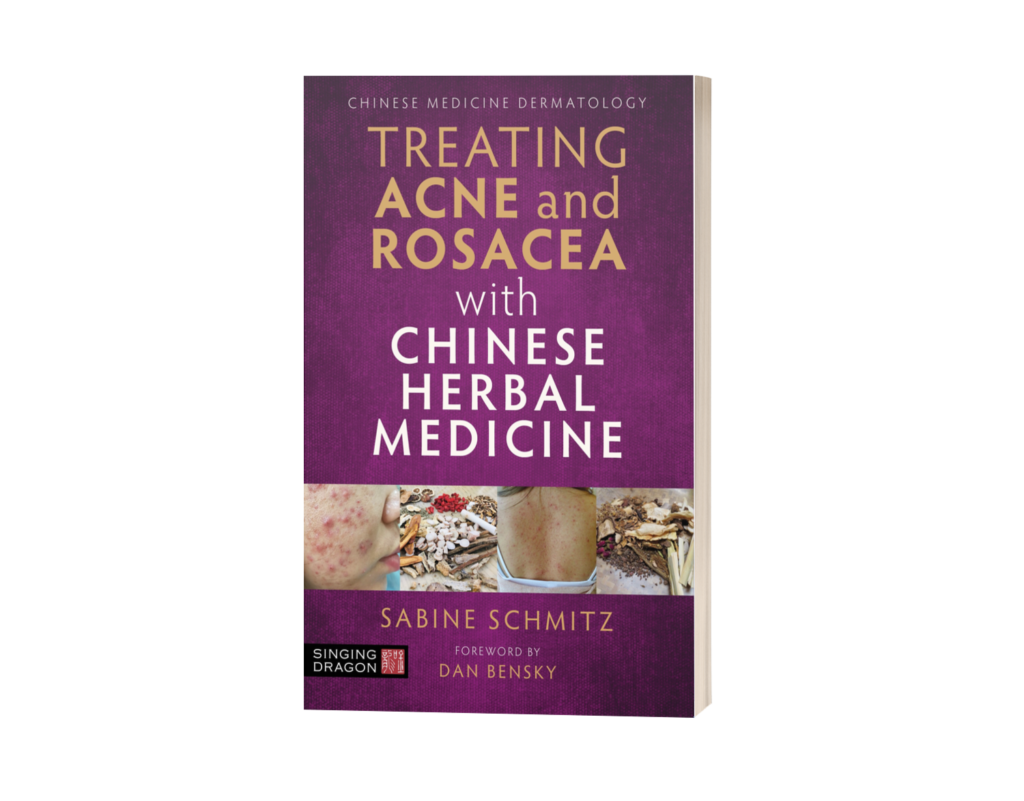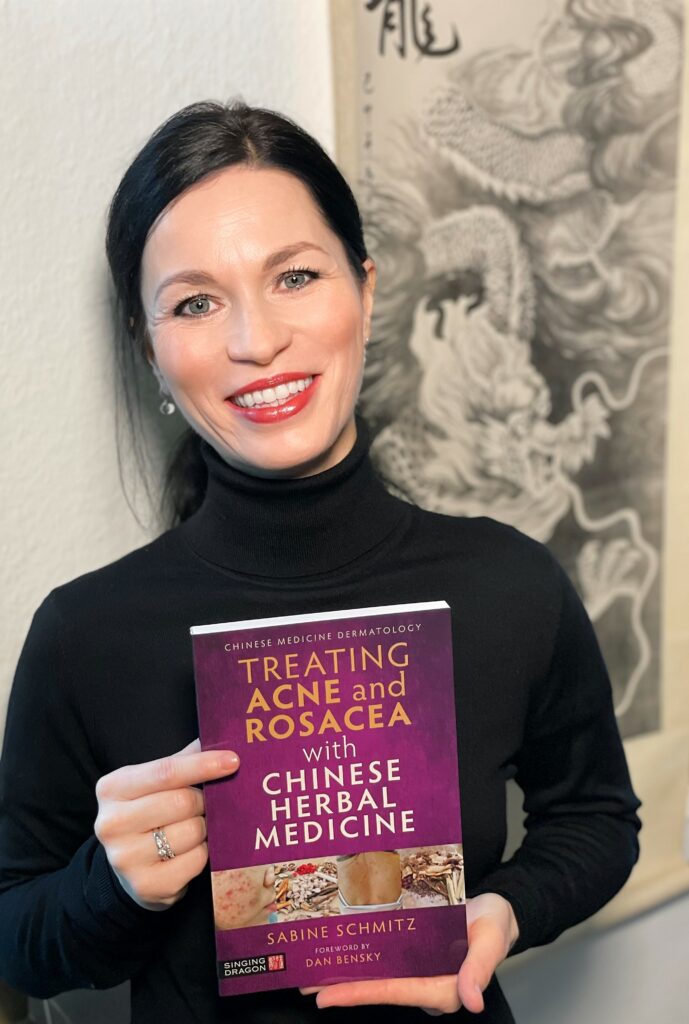
Practical and useful advice for the clinical management of patients with acne
Some of you may already know my first book Treating Psoriasis with Chinese Herbal Medicine. I am very excited to introduce my new book, which has been just released, which is called Treating Acne and Rosacea with Chinese Herbal Medicine. It is the second book in my series on dermatological diseases and zooms in on another of the most common skin conditions of today: Acne. The book covers prescriptions and treatment options with Chinese herbs for all types of acne and TCM syndromes. In addition to this, and for better understanding and assisting in your practice, a separate chapter on acne rosacea is included.
As crucial as Chinese herbal medicine is in the treatment of acne is, I always say – never let a patient go home without giving suitable dietary advice. As well as a good diet can improve the skin, an improper diet can worsen the skin. You and I know this from our daily practice. With the following information, I would like to give you an insight into how general diet rules work best and which ones you can give to your patients with acne.
Diet and health
First of all, times have changed, societies have changed and so have dietary and lifestyle habits. In general, meat, fast food and unhealthy sweets are consumed in excess; and numerous conversations with patients in my practice show as much. I am convinced that many diseases – including acne – stem from the same negative influences: an unhealthy diet, overeating and careless eating, pollution, a lifestyle that has an excess of sickness promoting factors[1], plus a deficiency of health-promoting factors[2]. Affluent diseases are on the rise[3], and acne is among these. I dare say that in so-called prosperous societies, living and eating habits, unfortunately, have little to do with being able to provide the body with the food it needs but more with constant consumption. I very often use the term “measure and middle” in practice to remind patients of a balanced diet and way of life. Less excess in life means leading a healthier one! Eating like a king and queen will definitely promote sickness.
Another major issue is food production and food processing. Modern agriculture and the modern food industry use many chemicals[4] and additives – and the effects are highly debatable and often criticized. Meat production and animal treatment have also been criticized for many years; not only for the lack of animal welfare (if there can be such a thing in meat production) but for the effects the hormones and medication used might have on consumers. From my practice, I can report that patients often show reactions to cheap sweeteners and flavour enhancers.[5] One thing can be said for certain: the food industry all too often produces cheap and unhealthy products that do not benefit the consumer.
Therefore, when talking to patients, it is very important to explain how essential a proper diet is. Patients never cease to surprise me, when they speak about their eating habits. Thus, I have to explain over and over how “bad” dietary habits affect the body and the skin in particular. When the principles of yǎng shēng were first developed, thousands of years ago, life and the environment were so different from what we know today. Life itself has become faster and demands have changed. We live in a fast-paced time, with fast, industrially processed and too much food. Everything has to happen quickly, even the food intake. Awareness is crucial.
The proper diet for acne: the best advice for your patients
“You are what you eat!” We know that following a healthy diet can help us remain healthy and in good shape. We also know that this can be a challenge. However, just as diet and lifestyle habits can worsen a skin disease, they can also improve the skin’s appearance; and acne is a very good example. We know that the effects of a “bad” diet accumulate over time and should be seen in a long-term context. The issue is not just the quality of food but also the quantity; irregular food consumption is also a factor. The following section lists the foods that should be avoided and provides preferable alternatives. In addition, it details information on eating habits and other practical tips we can share with our patients.
Always keep in mind that patients can speed their skin’s healing at home if we make them aware of their responsibility in their healing process.

General Guidelines according to TCM
Certainly, doctors and health experts from different fields have different perspectives on food and thus different dietary recommendations. However, in TCM (and many other nutritional philosophies agree) the general guidelines for patients are:
- Eat only when hungry
- Stop before feeling completely full
- Have three meals a day (warm food if possible)
- Do not eat too late in the evening (ideally not after 6 p.m.)
Pungent and Spicy Foods
Pepper, garlic, chilli, curry, and other pungent spices tend to produce internal heat, so they should be avoided. Patients with acne often tell me that they love and crave spicy, oily, and greasy foods, often accompanied by alcoholic drinks. Yet this combination is probably the worst possible eating pattern for them. These foods are an ideal breeding ground for dampness, which transforms into heat. The resulting damp-heat in the stomach (wèi 胃) and intestines cannot be transformed by the spleen and stomach, nor can the bowel overcome the stagnation and eliminate the imbalance. The damp heat has to go somewhere, so it rises to the upper body and mainly manifests as acne on the face, chest, back, and shoulders. For acne, it is particularly important to stop—or at least heavily restrict—consumption of alcohol, cigarettes, and coffee, as well as oily and spicy food. Patients should preferably eat mildly spiced food, and steam their food instead of roasting and frying in excess oil.
Another common TCM syndrome in acne is wind-heat. The mechanism is as follows: when pathogenic wind attacks, the upper part of the body (chest and above) is affected first, mainly the lungs. When wind invades the body, for instance, when the body’s defensive capabilities are weakened (weak protective qì, wèi qì 卫气) or after doing exercises, the wind causes a mismatch in the opening and the closing of the pores on the entire body. Sweating, for example, creates a perfect portal of entry for external factors like wind: pores open and wind can easily invade the body. If the sweat pores are obstructed, yáng qì will stagnate internally. Over time, heat will be produced. Heat accumulates in the lung channel and if combined with exogenous pathogenic wind, wind-heat may ascend to the face and subsequently result in acne (facial acne).
Here, foods that help nourish the lungs according to TCM are recommended, such as pear, peach, carrots, or white mushrooms. Also, cooling food with a sweet taste will help clear heat and moisten the lungs— for example, apple, watermelon, bamboo shoots, pumpkin, and some algae. Other heat-clearing food is recommended, such as green tea, mint, radish, or mung beans. When there is damp heat, patients should avoid spicy and greasy foods. Fresh fruits and vegetables that cool heat in the spleen and stomach are preferable instead: such as apples, pear, honeydew melon, watermelon, lime, mint, cucumber, radish, tomatoes, or soybeans—to mention just a few. Foods that can resolve dampness can also be beneficial, such as cherries or kohlrabi.
Sugar and Sweets
As a society, we consume too much sugar and sweet foods on a daily basis. The same process occurs as described above. A weakened spleen no longer transforms and transports properly, and dampness develops, followed by phlegm and so on. Sugar, and in particular sweets, are strictly forbidden if a patient has serious acne! This also applies to soft drinks such as cola and lemonade.
Dairy
The consumption of dairy products in the Western world is relatively high. This trend seems to be expanding into the Asian world: I have observed that products from cow’s milk, including milk, yoghurt, and cheese, are consumed more. Whatever the reason—global trends and advertising, or corporations seeking new markets—from a TCM point of view, this is an unfortunate development.
Chinese medicine considers cow’s milk as cooling and damp-forming, especially if consumed in excess. When we look at acne, the nature and consistency of the pimples clearly indicate that anything that produces dampness and phlegm should be avoided. It can be helpful when talking to patients with acne to explain how the spleen works according to Chinese medicine. Dairy products slow down digestive and absorptive functions, resulting in excess fluids and phlegm that block the skin. Thus, cow’s milk products should be strictly avoided by those who have serious acne.
However, when it comes to advising patients to avoid milk and dairy products, I frequently hear the sentence, “but I like it!”—it is the same with sweets, of course. You should show understanding but know that it will likely prove worthwhile to educate the patient and explain the effects of dairy products in their body. The other response to this kind of advice is, “I can’t do that!” What they actually mean is that they do not want to. We need to accept that change is difficult for many patients but also tell them straight up that they shed their responsibility by claiming change is impossible. Many people are afraid of change, although nature—including our physical body—is in the process of constant change. To make it easier for patients, make suggestions that they can easily adopt without having to change their routines completely. Fortunately, our modern society offers so many alternatives to products that we can usually find a solution for everything. Patients can substitute cow’s milk cheese with sheep’s or goat’s milk cheese. According to TCM theory, both are easier to digest. Tell them about alternative options for milk: almond, rice, soy, or oat milk.

Patient communication
The right nutrition has such positive effects on the patient’s skin, so dietary advice is essential. When advising patients, it is very helpful not only to list the individual products that need to be avoided, but also to explain how the spleen works according to Chinese medicine, and how certain foods slow down its transformative and transportive functions. Give every patient a simple but clear overview of these principles, in a language that they can grasp. In my experience, however, being too strict and dogmatic in our recommendations can be counterproductive. Moreover, complicated technical language and too much information at the beginning can be overwhelming, and sometimes even cause stress—it is your task to know the complex mechanisms at work and be able to convey them in a simple and understandable manner.
Also, let patients know that dietary changes will not show an effect overnight it will take time. Patients often complain, “I have not eaten this or that for two weeks and I have not seen any changes!” We need to let patients know that dietary changes often take a minimum of four to six weeks to show an effect. If your patients manage to stick to the dietary changes for this period of time, the results are often impressive—the skin appearance improves significantly, with fewer pimples and less inflammation, pain, and skin discolouration.
It is essential that patients understand how food and health are related. This will make it easier to follow your advice. One goal must be to enable patients to enjoy food, rather than simply consume it. Most importantly, an improved diet in combination with an individually tailored Chinese herbal prescription shows very good results in the treatment of skin diseases such as acne.
The longer I practice Chinese medicine, the more convinced I am of its possibilities. There is a clear demand from patients and we can satisfy them with good solutions, especially when it comes to skin diseases. TCM offers us an outstanding medicine for the treatment of many skin diseases. It’s not difficult and it’s not magic. Be flexible and keep it simple!
Read more about the detailed treatment of acne in my current book Treating Acne and Rosacea with Chinese Herbal Medicine.
References
[1] Tobacco and alcohol abuse, little sleep, work overload and physical inactivity, just to name a few.
[2] Healthy diet, sufficient sleep, maintaining a good work-life-balance, physical activity and so forth.
[3] Obesity, cancer, diabetes, chronic respiratory diseases and cardiovascular diseases, such as hypertension, stroke, and coronary heart disease are considered to be the most common examples of such diseases. Source: World Health Organization (WHO) homepage, 1 June 2018.
[4] For example, insecticides, fungicides, pesticides just to name a few. Many have side effects and can harm our health.
[5] For example, E621: Monosodium glutamate (MSG), also known as sodium glutamate. It is commonly added to Chinese food, canned food, instant soups and processed meats. A lot of patients report adverse reactions to foods containing MSG, be it headache, nausea, flushing or bloating and diarrhoea.